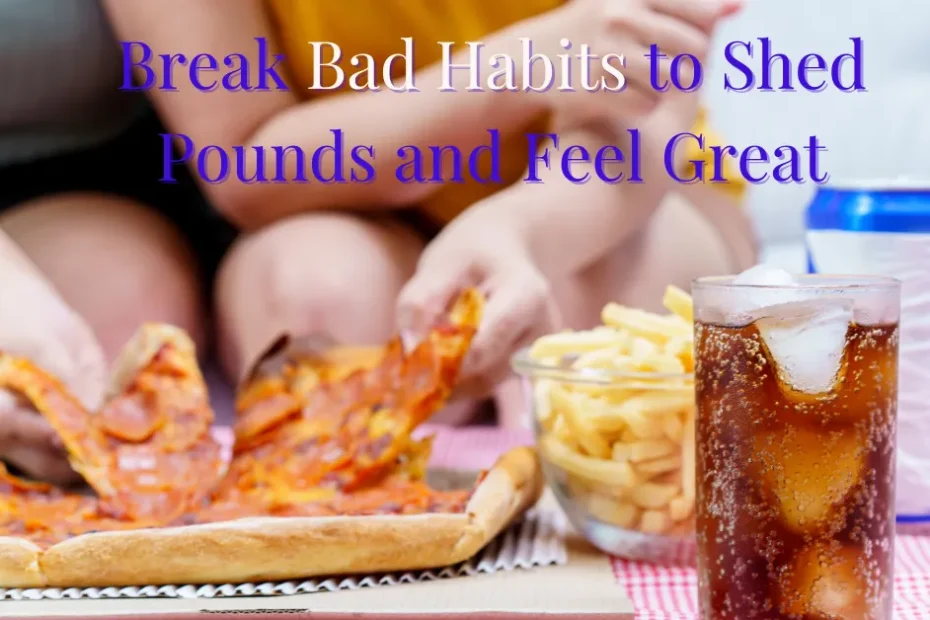What habits make you fat (bad habits)? The human body is amazing. Over millions of years, we’ve evolved to become incredibly efficient at storing energy and converting food into fuel. Unfortunately, our bodies aren’t perfect. Certain things we do every day cause us to gain weight.
Some of these bad habits are obvious, such as overeating or skipping meals. Others are less obvious, such as drinking too much soda or smoking cigarettes.
Some everyday bad habits contribute to obesity. These include consuming too much sugar, salt, and processed foods. In addition, people who eat late at night consume fewer calories throughout the day. To lose weight, you should try to break these bad habits.
Bad Habits People Have – Bad Habits that make you fat:
Bad habits prevent you from accomplishing your goals. They jeopardize your health — both mentally and physically. And they waste your time and energy.
James Clear said, ” Most of your bad habits are caused by two things… Stress and boredom. Most of the time, bad habits are simply a way of dealing with stress and boredom.”
Break These 9 Bad Habits to Shed Pounds and Feel Great
1. Eating before going to bed most likely
If you were to track everything you eat at sleep for one week, you would have noticed a pattern. It might be a waste of something sweet and high in calories. If you feel you should eat something, select a piece of fruit.
2. Bad sleep
If you don’t have an exact time to go to bed, you may get body chemistry from compatibility. This creates hormonal imbalances that trick you into believing you will only be satisfied If you eat.
3. Eat distracted – eat while watching tv
While getting lost down on the sofa to watch TV. Eating while watching television or working—and distracted or hurried eating can prompt you to eat more. Slowing down and savoring your food can help you control your intake.
4. Stress and anxiety
These two worlds can be your worst enemy. It can increase your weight and disrupt your quality of life. When we experience these emotions, we face “emotional hunger.” When this hits, we tend to eat more. We directly desire to alleviate this distress by eating candy or junk food.
If you must eat, try to consume the first piece of Fruit with water or tea.
5. Eating too fast
Eating fast makes it much easier to eat much more food than your body needs. The larger the bite, the quicker you’ll finish your food. Taking smaller bites can make the meal last longer, giving your brain time to catch up with your stomach. Recommendation: Look for eating healthy fast food
6. Being sedentary – physical inactivity and mental health
This is one of the significant factors in the global obesity epidemic. When we sit down, we eat. Then, the fat begins to creep around our midsections, and we become too keen to participate in physical activity.
When you have an inactive lifestyle (habits for health):
- Fewer calories You burn. This makes you more likely to gain weight.
- You may lose muscle strength and endurance because you are not using your muscles as much
- Bones may get weaker and lose some mineral content
- Your metabolism may be affected, and your body may have more trouble breaking down fats and sugars
- Your immune system may not work as well
- Poorer blood circulation
- Your body may have more inflammation
7. Not eating breakfast
We might skip breakfast on our way to work or school, but most dieticians and healthcare professionals agree it is the most important meal.
Our food in the morning activates our metabolism. And when this switch is triggered, it stays powered all day. Without an excellent metabolic rate, it’s nearly impossible to burn calories. Your first meal should include protein and a small portion of healthy fats, food, and complex carbohydrates combined.
8. Excess Salt Consumption
The human body requires a small amount of sodium to conduct nerve impulses, contract and relax muscles, and maintain the proper balance of water and minerals. If the flavor is what you are looking for, try other methods to spice up your meal. There is some evidence that too much salt can damage the heart, aorta, and kidneys without increasing blood pressure and that it may be bad for bones, too.
9. Not Consuming Enough Water
Our kidneys and other organs are difficult. It works properly when you don’t have enough water.
Experts suggest drinking at least 2 liters of water daily to stay hydrated. This will improve waste elimination and prevent excess fluid accumulation. One way to stay hydrated is to drink tea or natural juices. Consuming soft drinks is not a good source of fluids. Elevated sugar levels in soft drinks only lead to weight gain.
How To Break Habits – Healthy Eating Habits – Weight Loss Strategies
Breaking Bad Habits: Understanding the 21-Day Rule.
To begin with, choose one unhealthy habit you wish to eliminate or change. Or, choose a healthy
habit you want to adopt as part of your behavior. If it is a habit to eliminate, you may wish to go “cold
turkey” or have a gradual tapering off.
Now that you have decided which unhealthy habit to eliminate or which new habit to adopt decide on the
date you will begin your behavior change. Give this date a good deal of thought, and then write it
down.
The Importance of the 21-Day Rule
The notion that it takes 21 days to break a habit is widely accepted, but is it accurate? Research suggests that various factors influence habit formation, including the complexity of the behavior and individual differences. While the 21-day guideline is helpful, it’s essential to approach habit change with flexibility and patience.
Steps to Breaking Habits
1. Self-assessment and Goal Setting
Begin by identifying the habit you wish to change or eliminate. Clarity is critical, whether reducing screen time, cutting back on sugary snacks, or incorporating daily exercise. Define your goal in favorable terms and write it down for clarity and accountability.
2. Understanding Motivation
Reflect on the reasons behind your desire to change the habit. Are you seeking improved health, enhanced productivity, or greater happiness? Understanding your motivations can strengthen your commitment and resilience throughout the process.
3. Creating a Plan of Action
Once you’ve defined your goal and motivations, it’s time to devise a plan of action. If you aim to eliminate a habit, consider whether a gradual reduction or abrupt cessation would be more effective. To adopt new habits, establish a precise start date and outline the steps needed to integrate the behavior into your routine.
4. Implementing Alternative Routines
Breaking habits often involves replacing them with healthier alternatives. Identify triggers and challenging situations that prompt the habit you want to change. Then, develop alternative routines or activities to redirect your behavior in those moments. Whether going for a walk, practicing deep breathing, or engaging in a hobby, having substitute activities can bolster your success.
Overcoming Challenges
While the 21-day rule provides a valuable framework, habit change is rarely linear. Be prepared for setbacks and moments of temptation along the way. Instead of viewing these as failures, see them as opportunities for growth and learning. Stay committed to your goal and celebrate progress, no matter how small.
Conclusion
In conclusion, breaking habits requires intention, effort, and perseverance. By understanding the principles behind the 21-day rule and implementing effective strategies, you can successfully reshape your behaviors and cultivate positive habits. Change takes time, so be patient with yourself and stay focused on your goals.


